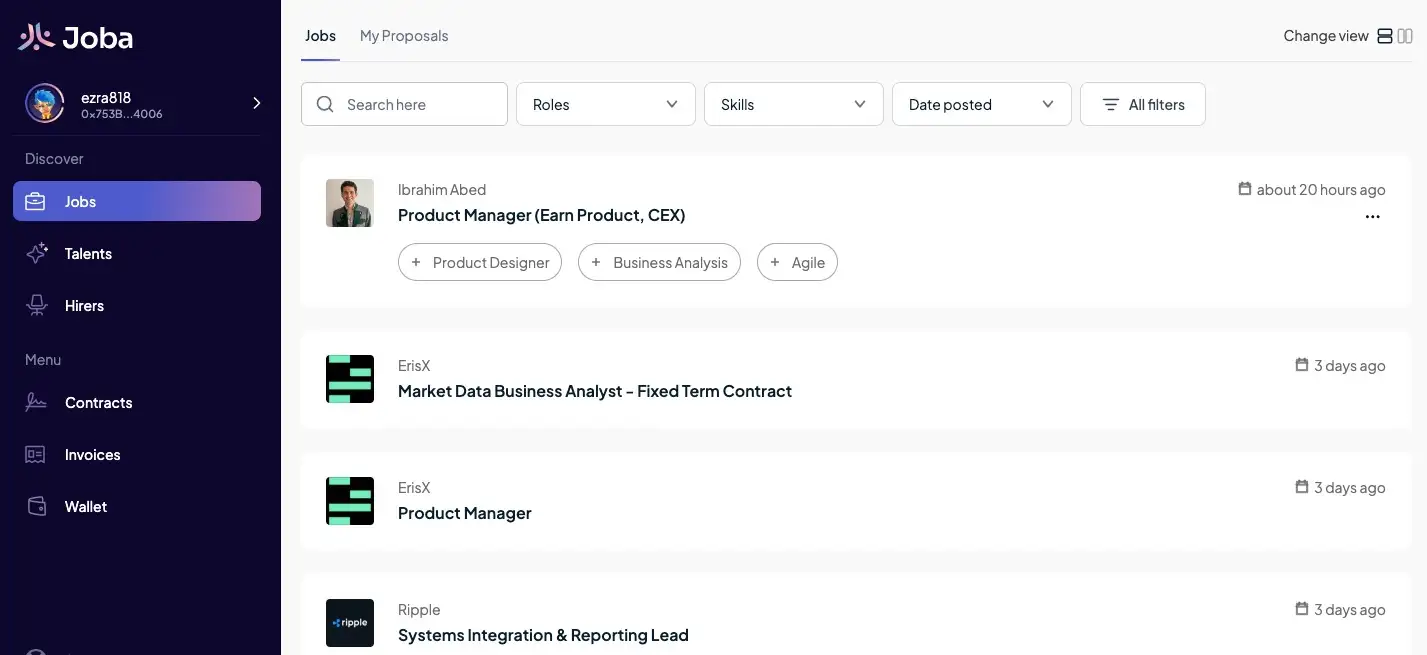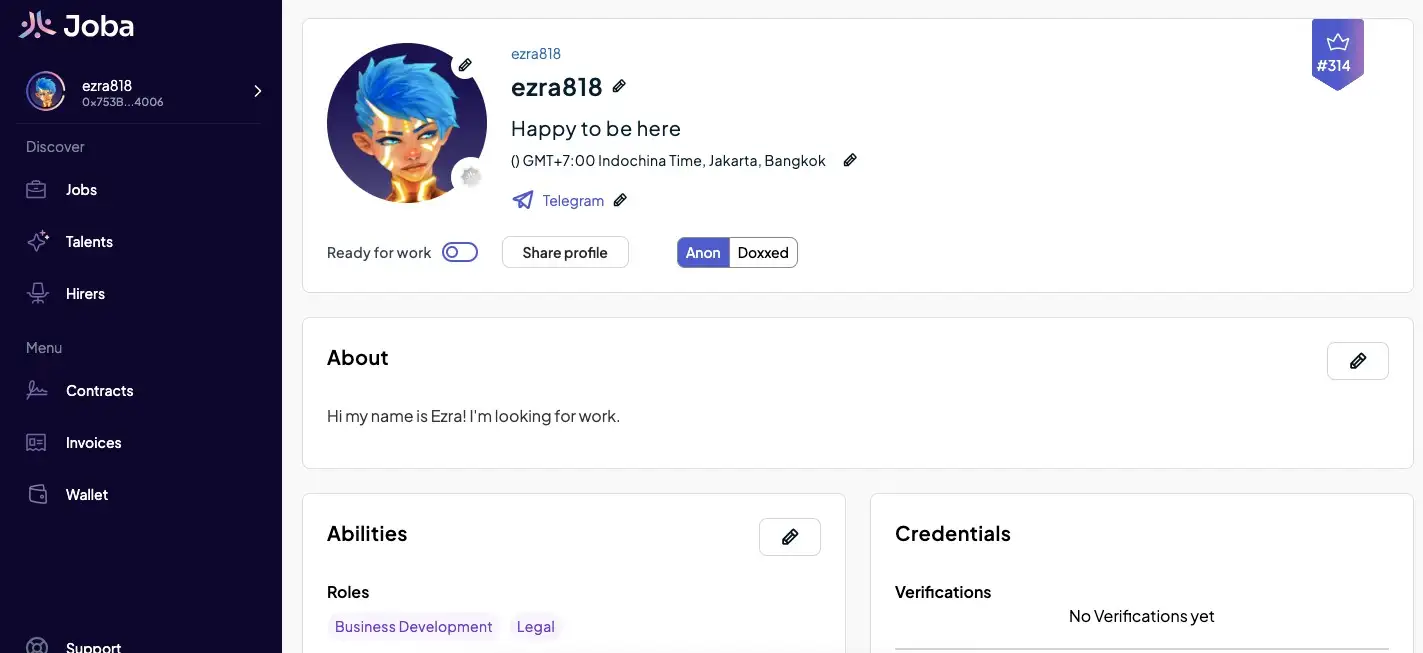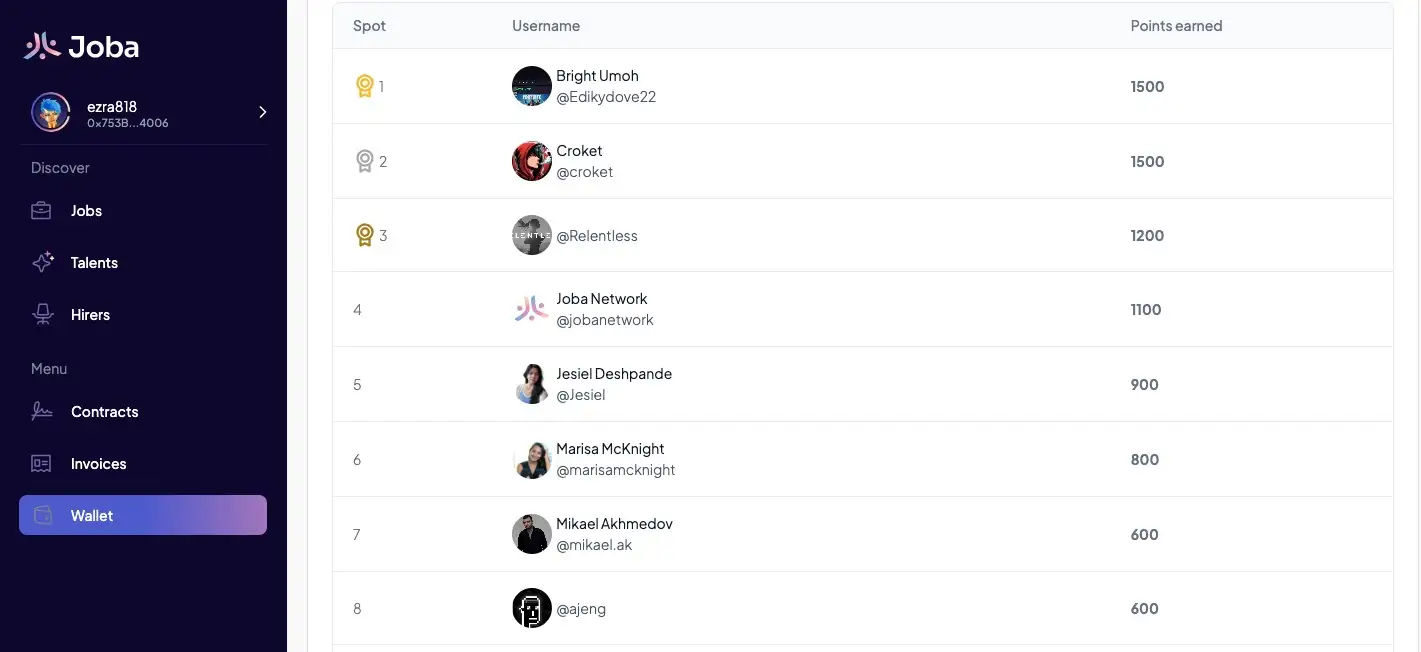About Joba Network
Joba Network is a groundbreaking platform designed to address the inherent challenges of verifying professional credentials and building credit in a borderless, decentralized world. In today's global economy, traditional methods of establishing trust, such as institutional credentials and credit scores, often fall short, particularly for individuals in emerging markets or those engaged in the gig economy. Joba Network's mission is to create a decentralized ecosystem where individuals can autonomously verify their professional experiences, build an on-chain reputation, and ultimately gain access to credit and job opportunities without being constrained by geographical or institutional limitations.
The platform leverages blockchain technology to create a trustless system where workers and employers can interact with full transparency. By allowing users to build a verifiable on-chain reputation, Joba Network empowers them to demonstrate their skills and job history in a way that is both tamper-proof and universally accessible. This reputation can be utilized not only to secure employment but also to access financial services, including credit, which traditionally rely on centralized credit scoring systems. Joba Network's innovative approach promises to democratize access to professional opportunities and credit, particularly for those who have been historically marginalized by conventional systems. This platform is poised to redefine how professional credibility is established and maintained in a decentralized, digital-first economy.
Joba Network was conceived as a response to the growing need for a decentralized and trustworthy way to verify professional credentials in a rapidly evolving global workforce. With the rise of remote work, freelancing, and the gig economy, traditional methods of verifying job experience and professional credibility have become increasingly inadequate. Joba Network addresses this challenge by creating a decentralized platform that allows users to verify their work experiences and professional history on the blockchain, thus enabling them to build a permanent, verifiable on-chain reputation.
The project’s development has been shaped by the recognition that many workers, particularly those in emerging markets or non-traditional job sectors, lack access to formal credentials and credit. Joba Network provides these individuals with the tools to independently verify their professional experiences and build a reputation that is universally recognized and respected. This reputation is stored on the blockchain, making it immutable and accessible to anyone with an internet connection.
Key to the platform’s functionality is its decentralized identity verification system. Unlike traditional systems that rely on centralized authorities to vouch for a person’s credentials, Joba Network uses blockchain technology to create a trustless environment where credentials are verified by the network itself. This reduces the potential for fraud and increases the reliability of the credentials being presented. Workers can showcase their verified experiences to potential employers, while employers can confidently hire candidates knowing that their credentials have been rigorously vetted by the network.
The platform also includes tools for both workers and hirers. Workers can claim their identities by completing jobs and verifying their experiences on the platform, while hirers can post jobs, review candidates' verified credentials, and engage in secure transactions. Joba Network’s transparent and decentralized approach to professional verification and credit building sets it apart from other platforms in the market.
Competitors to Joba Network might include other decentralized freelance and professional verification platforms such as Braintrust, which uses blockchain to connect freelancers with clients, and WorkQuest, a platform that focuses on decentralized employment and payroll services. However, Joba Network distinguishes itself by focusing specifically on the creation of on-chain professional reputations and borderless credit, making it a unique player in the decentralized professional services space.
Since its inception, Joba Network has achieved several key milestones, including the development of its decentralized identity verification system and the successful onboarding of early users to its platform. As the project continues to grow, it aims to expand its user base globally and integrate additional features that will further enhance its utility for both workers and employers.
- Borderless Credit: Joba Network enables users to build and maintain a credit score that is recognized globally, independent of traditional financial institutions. This feature is particularly valuable for individuals in emerging markets or those without access to conventional banking services.
- On-chain Reputation: Users can earn and sustain a verifiable professional reputation on the blockchain. This on-chain reputation is immutable and universally accessible, allowing individuals to leverage their professional history in a trustworthy and transparent manner.
- Decentralized Identity Verification: The platform’s decentralized identity verification system allows users to verify their job experiences and professional credentials without relying on centralized authorities. This reduces the risk of fraud and increases the credibility of the credentials presented on the platform.
- Worker and Hirer Tools: Joba Network provides a suite of tools for both workers and employers. Workers can complete jobs and verify their experiences on the platform, while employers can post job listings, review candidates' verified credentials, and engage in secure transactions.
- Democratization of Opportunities: By eliminating geographical and institutional barriers, Joba Network ensures that professional opportunities and credit access are available to everyone, regardless of their location or background. This democratization of opportunity is a key differentiator of the platform.
- Trustless Environment: The use of blockchain technology creates a trustless environment where transactions and verifications occur without the need for intermediaries. This enhances the security and transparency of the platform.
- Global Reach: The platform is designed to serve a global user base, making it an ideal solution for freelancers, remote workers, and professionals in the gig economy who operate across borders.
Getting started with Joba Network is straightforward and accessible to users around the world. Here’s a step-by-step guide to begin your journey:
- Visit the Joba Network Website: Start by visiting the official Joba Network website to access the platform.
- Create an Account: Sign up for an account by providing your basic information. You may need to connect a digital wallet if the platform requires blockchain-based interactions.
- Verify Your Identity: To build your on-chain reputation, you’ll need to verify your identity. This involves submitting documentation or proof of your professional experience, which will be verified through .
- Explore the Platform: Once your identity is verified, explore the platform’s features. Browse job listings, complete tasks, or start verifying your work history to build your reputation.
- Complete Jobs: Engage in tasks or jobs posted on the platform. As you complete these jobs, your experiences will be recorded on the blockchain, contributing to your on-chain reputation.
- Build Your Reputation: Continuously enhance your on-chain reputation by successfully completing jobs and having your experiences verified. This reputation is key to accessing further opportunities and credit.
- Utilize Additional Features: Leverage other tools and features offered by Joba Network, such as seeking credit or networking with other professionals on the platform.
- Stay Updated: Joba Network may introduce new features or updates, so keep an eye on announcements and updates from the platform to maximize your experience.
Joba Network Reviews by Real Users
Joba Network FAQ
Joba Network uses a decentralized identity verification system that leverages blockchain technology to verify and record professional credentials. This system ensures that all data is tamper-proof and verified by the network, rather than relying on centralized authorities. Workers' experiences and job histories are securely stored on the blockchain, making them immutable and accessible to anyone globally.
Joba Network stands out by focusing on the creation of a verifiable on-chain reputation that can be used to build borderless credit. Unlike other platforms that may simply connect freelancers with employers, Joba Network enables users to build a globally recognized reputation and credit score, which can be used to access jobs and financial services. The platform’s approach to democratizing professional opportunities is unique in the decentralized space.
Yes, your on-chain reputation earned on Joba Network is universally accessible and can be referenced by other decentralized applications (dApps) and platforms that recognize blockchain-verified credentials. This allows you to leverage your reputation for opportunities beyond the Joba Network, making it a powerful tool for career growth and financial inclusion in the decentralized economy.
Joba Network empowers workers in emerging markets by providing a platform where they can build and verify their professional experiences without relying on traditional institutions. This is particularly valuable for those without access to formal credentials or banking services. By enabling the creation of a globally recognized on-chain reputation, Joba Network helps these workers access job opportunities and build credit, fostering economic growth and inclusion.
To start building your on-chain reputation with Joba Network, follow these steps: 1) Sign up on the platform, 2) Verify your identity by submitting your professional experiences, 3) Engage in tasks and jobs to record your verified experiences on the blockchain, 4) Continuously enhance your reputation by completing more jobs and tasks, 5) Leverage your on-chain reputation to access more opportunities and credit.
You Might Also Like












